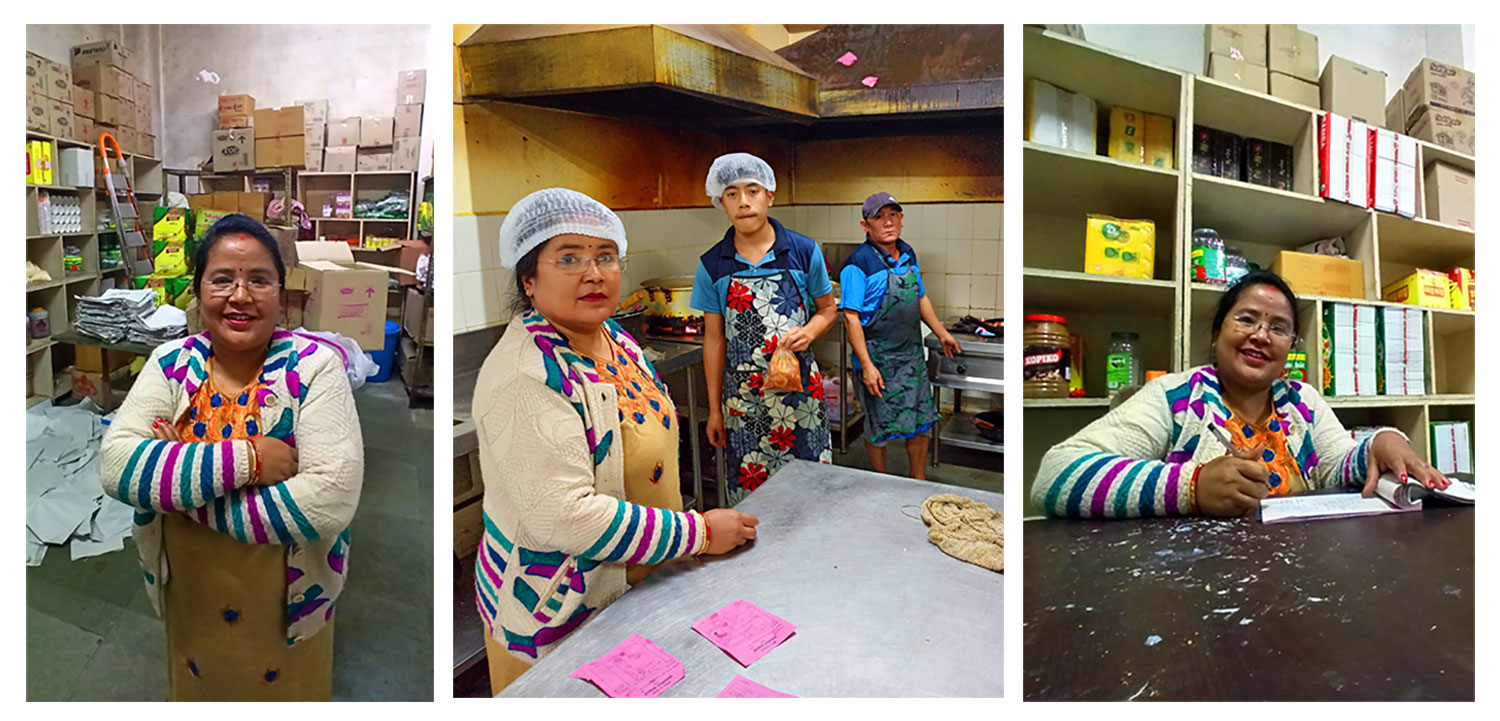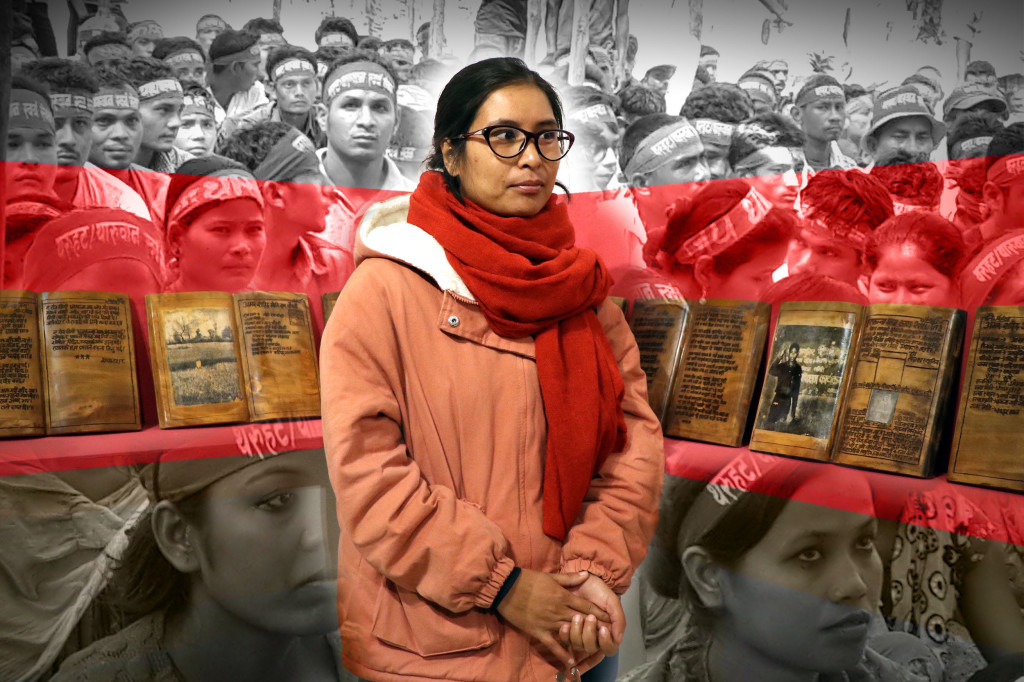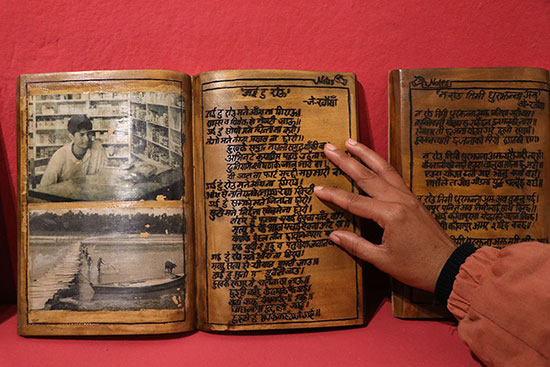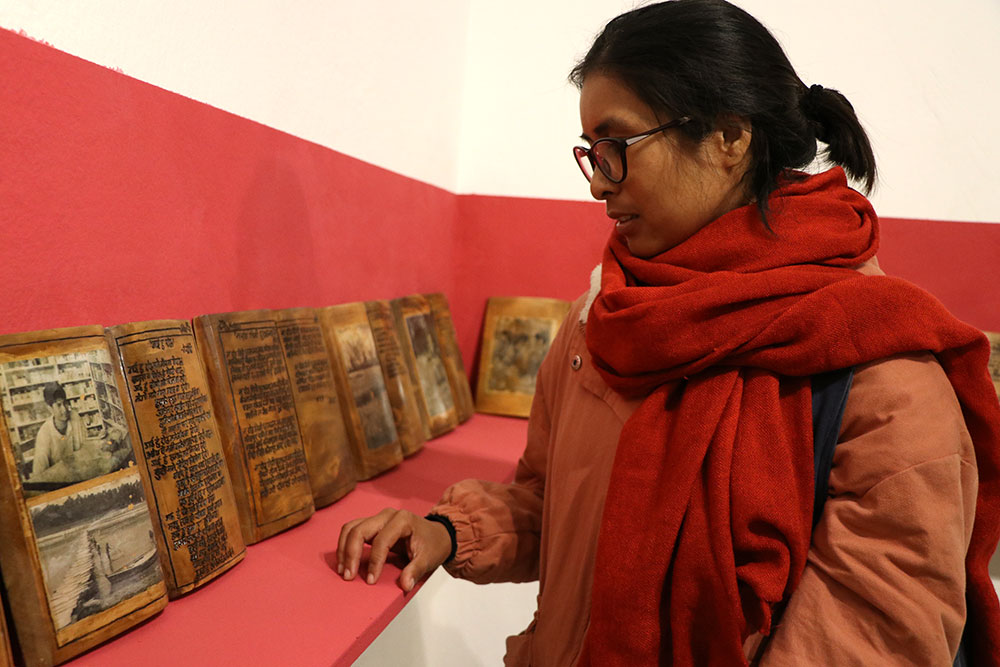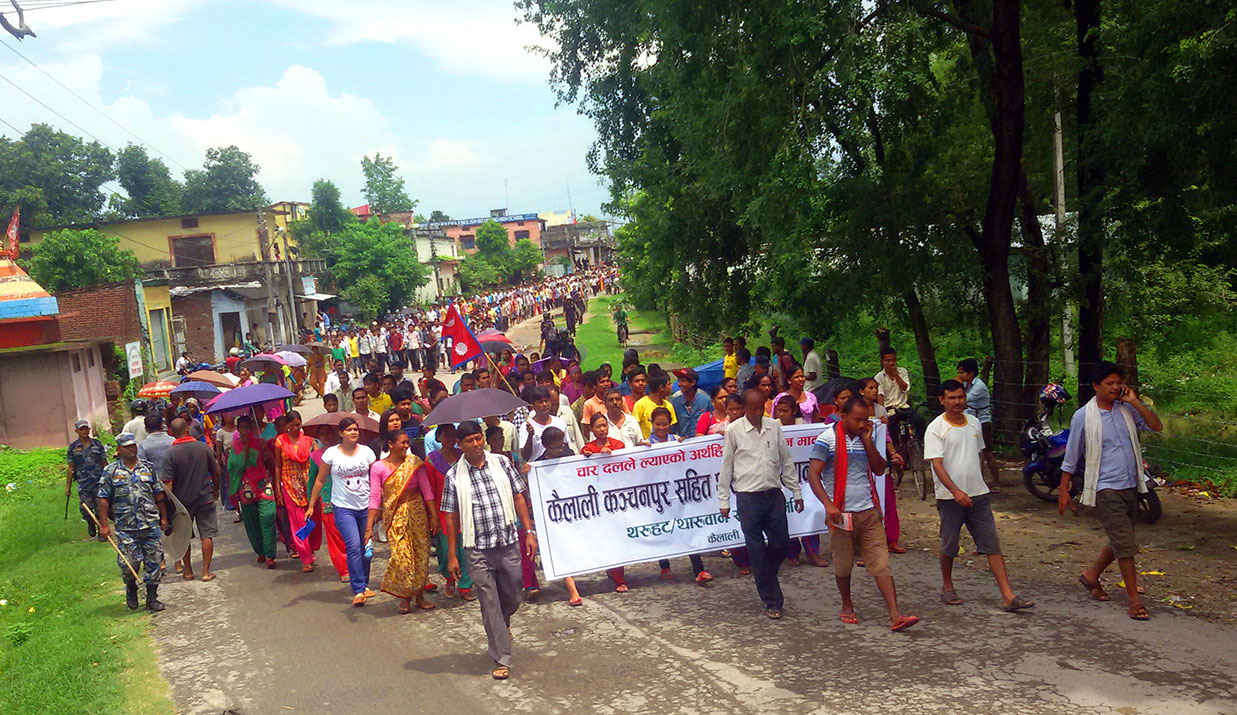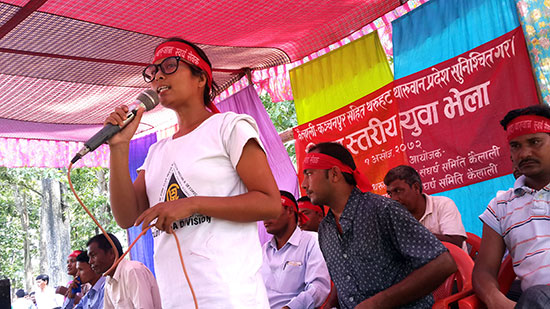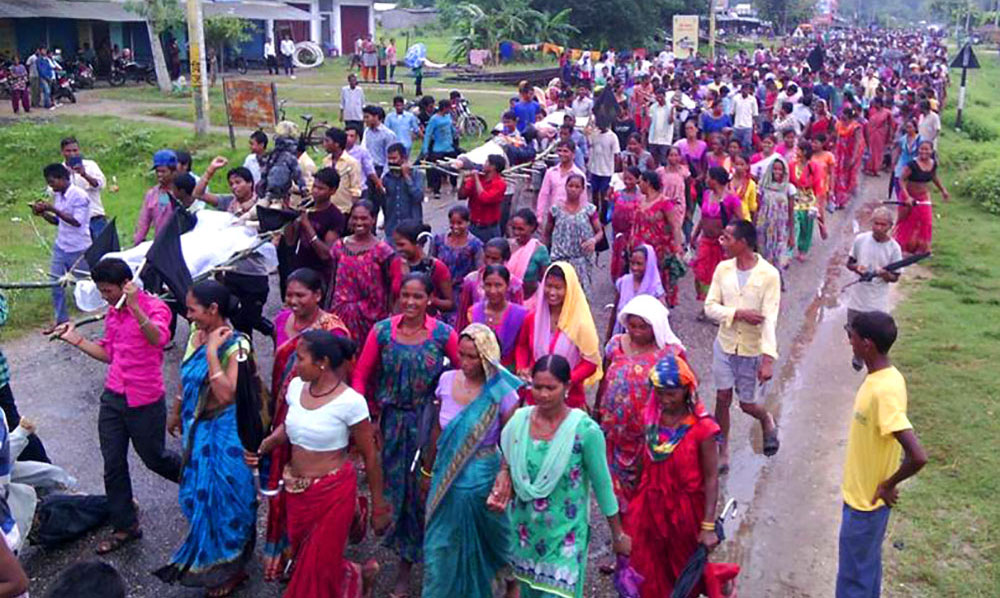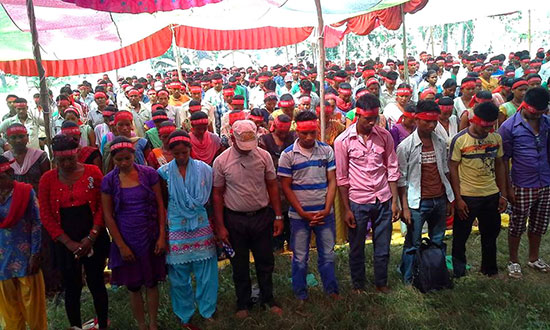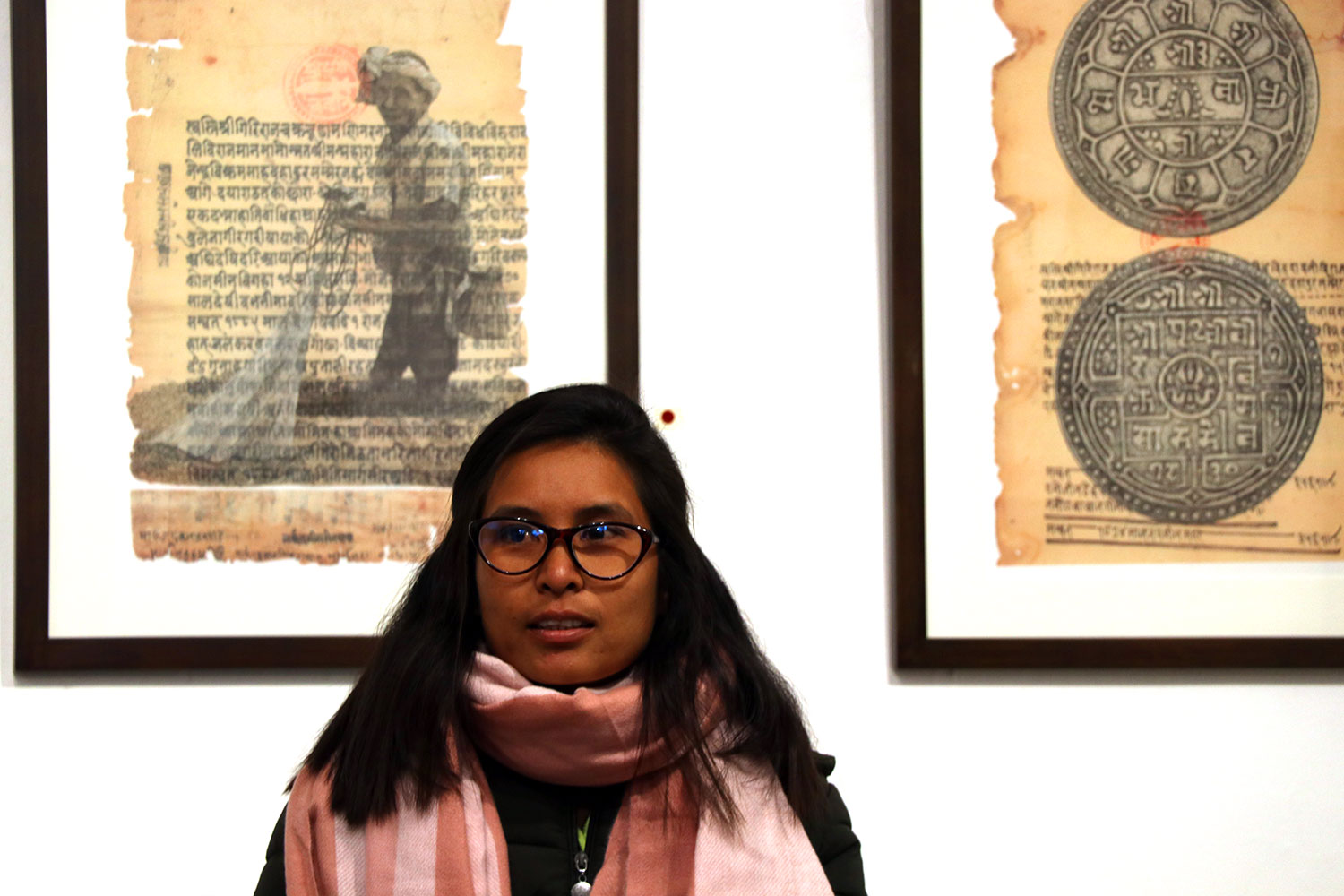It was my dream to study in a school but alas because of when and where I was born it remains a dream. At times, I think if I was trained to use my skills and talent and I would have been a professional today. If I had been given an opportunity, I would have achieved a lot.
I was born into a simple farming family in Nuwakot. I grew up with 6 brothers and 4 sisters in the village. We were a well-to-do family, meaning, we didn’t have difficulties in fulfilling our basic needs. We had property in the village and had to work from dawn till dusk. We couldn’t sit idly as there were a lot of household chores and plenty to do be done on the farm. My mother used to assign work to each of us every day. Some days tending the herd, and other days help out on the farm.
She believed that if girls were educated,
they would elope and run away with boys.
When I was old enough, I found out that my parents weren’t happy when I was born. Normally, babies are born after 9 months, but in my case, I was born after 12 months. Thus, they didn’t find me auspicious. My father had then come to Kathmandu to meet an astrologer and find some solution. Apparently, the astrologer had told my father that I was auspicious and if I were taught how to read and write, I would have a bright future. Influenced by this, my father wanted me to be educated and admitted me to a school. But it didn’t last for too long. In a matter of days of me joining the school, my mother put a stop to it. She believed that if girls were educated, they would elope and run away with boys. I cried for the first couple of days but I had no choice.
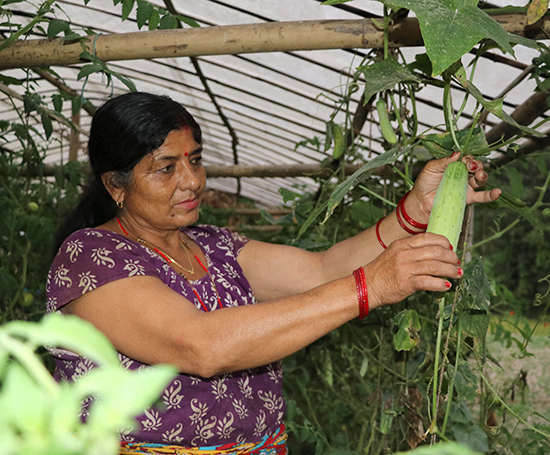 While I was grazing the animals, and herding them to areas of good forage, my uncle’s daughters used to go to school. I really wanted to go to school; I even tried to hurt myself with the hope that they would send me. One-day, while preparing animal feed, I tried to burn myself. I still have the burn scars. No matter what I did though, my desire to go to school was never fulfilled.
While I was grazing the animals, and herding them to areas of good forage, my uncle’s daughters used to go to school. I really wanted to go to school; I even tried to hurt myself with the hope that they would send me. One-day, while preparing animal feed, I tried to burn myself. I still have the burn scars. No matter what I did though, my desire to go to school was never fulfilled.
One day my father brought me to Kathmandu. He had said it was to meet a brother but turned out, he actually got me here to get me married. He introduced me to all my new family members. Considering my father’s decision, I agreed to get married at 18 years.
After my marriage, even though I was free to do things I wanted to, I still couldn’t. I would be busy all-day, farming, and doing chores. My husband was studying then and my father-in-law used to work in a bank. His salary alone was hardly sufficient for my husband’s education. I did a lot of household work at my parent’s home, but I had no idea how to run a household. We had a lot of financial troubles, so I started working outside my home for some extra money. After finishing my household chores, I would do labor for others.
I earned Rs. 3 after working for an entire day.
Five years after my marriage, I gave birth to my eldest son. Soon after he was born, I started cattle farming. It was my uncle who advised me to do cattle farming. Although I was really keen to start cattle farming, I couldn’t because of my financial situation. A few days later, my uncle bought me cows with his own money. I was so happy. My father-in-law helped me sell whatever little milk we got.
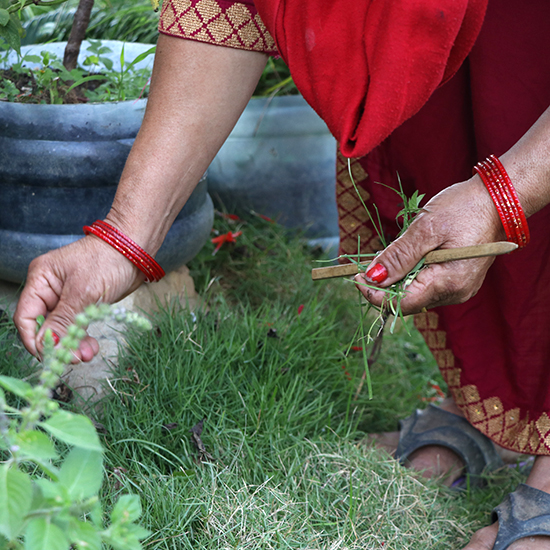 I wanted to add more cows but I had no money. I then remembered that my father had once mentioned giving me Rs. 10,000. I went to visit my parents with the hope that they would give me the money. After a lot of crying and explaining, my father finally agreed. I bought cows with that money and started saving. Anything I saved; I began investing in the cattle. From 2 cows to 4 cows, 4 to 6, so on and so forth, I started to set goals and build my own confidence.
I wanted to add more cows but I had no money. I then remembered that my father had once mentioned giving me Rs. 10,000. I went to visit my parents with the hope that they would give me the money. After a lot of crying and explaining, my father finally agreed. I bought cows with that money and started saving. Anything I saved; I began investing in the cattle. From 2 cows to 4 cows, 4 to 6, so on and so forth, I started to set goals and build my own confidence.
After my firstborn, I gave birth to another son and a daughter. I was really happy to give birth to a daughter. I wasn’t able to get an education, solely because I was a daughter. I had promised myself that I would send my daughter to a good school without any discrimination. Those days it wasn’t an easy task to send my 3 children to a private school, but I was determined. Our financial situation was so weak that when my son had once asked me for Rs 5 for lunch, I wasn’t even able to give him that money. Even though I wasn’t able to give them enough food, I was very careful about their education. My husband was working at a bank then, but since he was stationed outside of Kathmandu, I never asked him for any money. I managed everything with whatever little money I made.
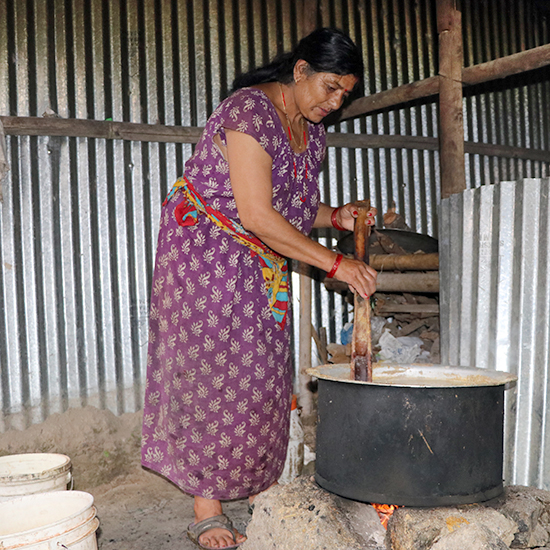 One of those days, I had heard about some training on agriculture and cattle farming being given to women. I wasn’t able to directly participate in the training, but I got a job to deliver snacks during the training. They were teaching about agriculture and cattle farming when I got there to deliver the food. I would sit there for an hour and listen. The next meeting, I organized at my own house so I could participate and during this meeting, they taught us how women can be independent and how things can be in our favor once we were independent. I got even more confident after this training.
One of those days, I had heard about some training on agriculture and cattle farming being given to women. I wasn’t able to directly participate in the training, but I got a job to deliver snacks during the training. They were teaching about agriculture and cattle farming when I got there to deliver the food. I would sit there for an hour and listen. The next meeting, I organized at my own house so I could participate and during this meeting, they taught us how women can be independent and how things can be in our favor once we were independent. I got even more confident after this training.
I came to know about the “Aama Samuha” through this training and I also got actively involved in it. Aama Samuha later brought a goat farming program to our village as well and all of us got 2 goats in our name. 4 of my friends who didn’t want goats gave me their goats and I ended up with 10 goats. I was very confident that my financial situation would get better with 4 cows and 10 goats.
However, things never turn out the way we plan. All the goats died the very next day I got them home. All my dreams of being finically independent were shattered. Nevertheless, I didn’t give up. I collected all my friends in the village and started an inquiry. I handed over a written application along with the inquiry report to the Aama Samuha. After the hearing, the Aama Samuha again granted me money to buy 10 goats. Within 2 years, I was successful in returning 10 goats back to the Samuha. Turns out I had a net profit of Rs. 22,000 after returning those 10 goats. With that money, I made a gold ring.
I cannot explain how happy I was that day
when I made that gold ring with my own money.
Along with all this, I had also done some vegetable farming. Because our house and our farm were on the hill, we faced many water-related issues. During monsoon, we had very little vegetables and besides that, I really didn’t know how to transport these vegetables to the bazaar. Fortunately, one of my neighbors taught me how to take the vegetables to the bazaar and sell them. Keeping aside all the bad ones at home, I used to sell good vegetables. After getting home, my elder son would help me with the calculations. Most of the time, there wouldn’t be enough money. Because I was always very weak at math, my son sent me to adult education classes.
I would finish all my chores at home and go to the classes in the evening. After 6 months of learning, it became a lot easier for me to do the calculations. Every time I would sit down to do the calculations with a pen in my hand, it felt as if my long-awaited dream of education had finally come true.
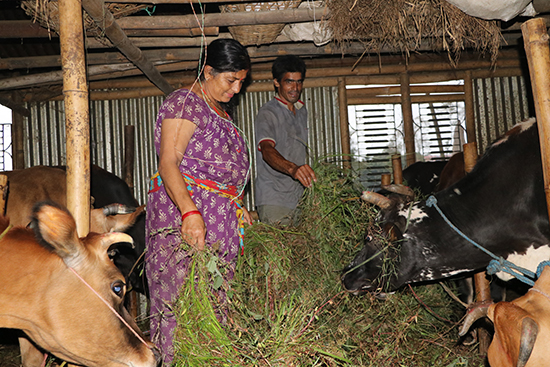 With my savings, I made cow sheds and 3 tunnels. Slowly, I hired helpers to help me with cattle farming and to sell the milk. Now I have 11 cows. Apart from cattle farming, vegetable farming is also doing good. I am no longer a farmer; I am a businesswoman. I pay 25,000 rupees every month to each of my helpers. To this day, many women have to explain their earnings to their husbands. But I never have to explain anything. I can spend or use my money, my way. I am an independent woman.
With my savings, I made cow sheds and 3 tunnels. Slowly, I hired helpers to help me with cattle farming and to sell the milk. Now I have 11 cows. Apart from cattle farming, vegetable farming is also doing good. I am no longer a farmer; I am a businesswoman. I pay 25,000 rupees every month to each of my helpers. To this day, many women have to explain their earnings to their husbands. But I never have to explain anything. I can spend or use my money, my way. I am an independent woman.
Nowadays, everyone tells me to stop working and to rest at home but I cannot, my heart doesn’t let me. I want to expand my cattle farming and vegetable farming business even more. Many of us here in Nepal, look for jobs abroad, and leave the country for foreign employment. Instead of working in a foreign land for someone else, it’s wiser to work in your own field. The chances of becoming successful are a lot better.
Look around, explore, and recognize your own opportunities and work hard. Your hard work will definitely pay off.
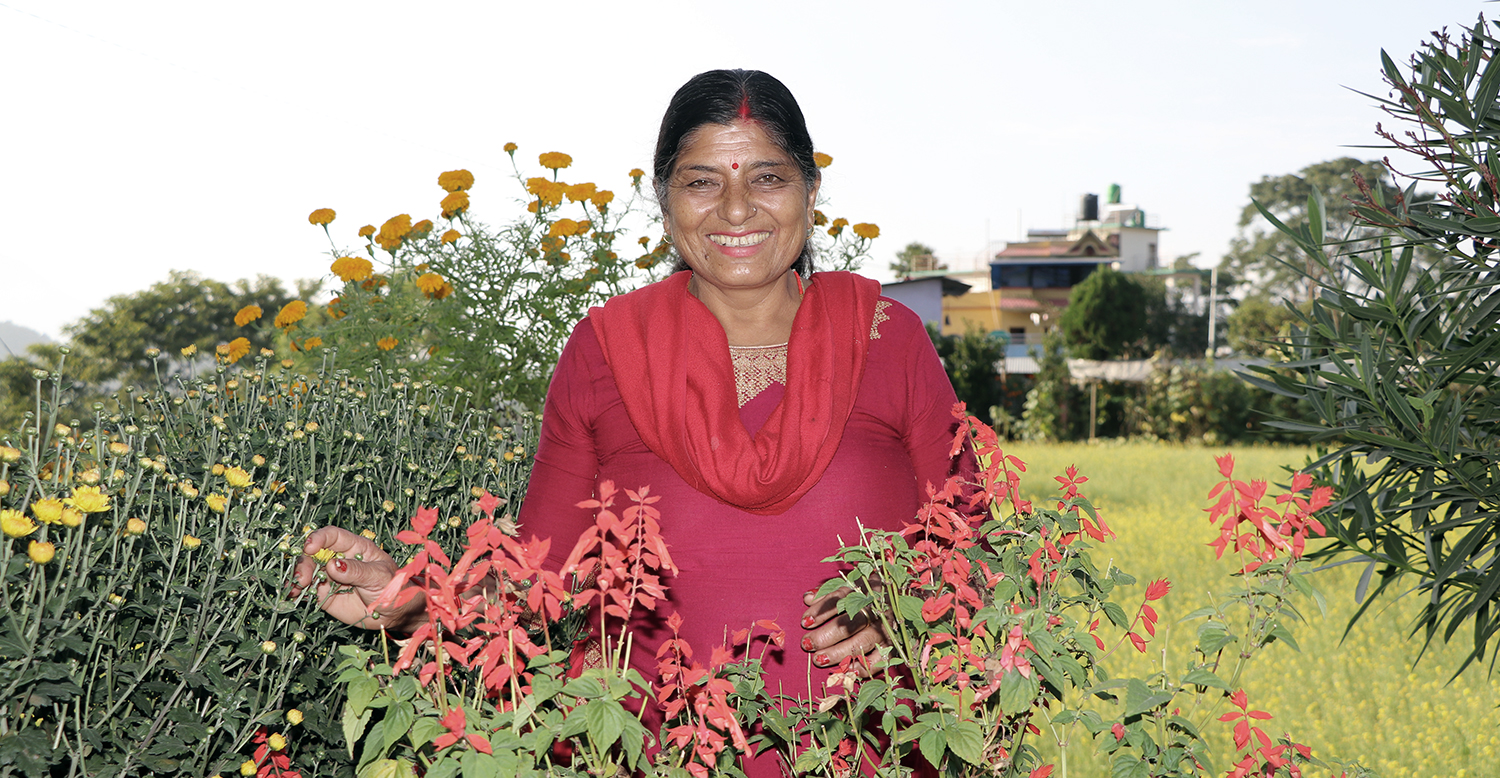
***


 Gradually, I was being known for my literature. When I was in school, I had already published my collection of poems and stories. I used to take part in different competitions. In the first competition, I had won the first prize and which motivated me a lot. I would normally win most of the competitions. Also, my teachers and even my mother would usually predict that I would win. Even my friends would assume that I will win the competition that I take part in. Most of the time it was inspiring but gradually I started to feel the pressure to win every competition. Later I realized that it is more important to improve your skill and build your capacity than to win the competitions.
Gradually, I was being known for my literature. When I was in school, I had already published my collection of poems and stories. I used to take part in different competitions. In the first competition, I had won the first prize and which motivated me a lot. I would normally win most of the competitions. Also, my teachers and even my mother would usually predict that I would win. Even my friends would assume that I will win the competition that I take part in. Most of the time it was inspiring but gradually I started to feel the pressure to win every competition. Later I realized that it is more important to improve your skill and build your capacity than to win the competitions.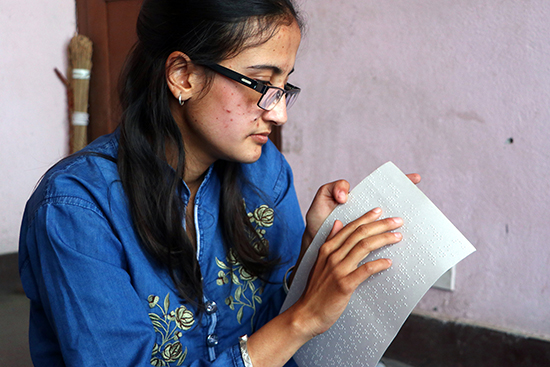 My mother visited Tilganga hospital many times for my eye treatment. During that course, she saw a huge crowd of people who had vision impairment, and that helped her realize the scene and gradually accept the truth. The only thing that my eyes are capable of differentiating is the brightness and the darkness of day and night. After accepting my truth, my mother started to focus on how to make me more competent and more capable. She also learned how to use Braille. Throughout my learning process, she never allowed my vision impairment to be my weakness. However, because there weren’t any disability-friendly schools for people like me, we were compelled to study in a regular school.
My mother visited Tilganga hospital many times for my eye treatment. During that course, she saw a huge crowd of people who had vision impairment, and that helped her realize the scene and gradually accept the truth. The only thing that my eyes are capable of differentiating is the brightness and the darkness of day and night. After accepting my truth, my mother started to focus on how to make me more competent and more capable. She also learned how to use Braille. Throughout my learning process, she never allowed my vision impairment to be my weakness. However, because there weren’t any disability-friendly schools for people like me, we were compelled to study in a regular school.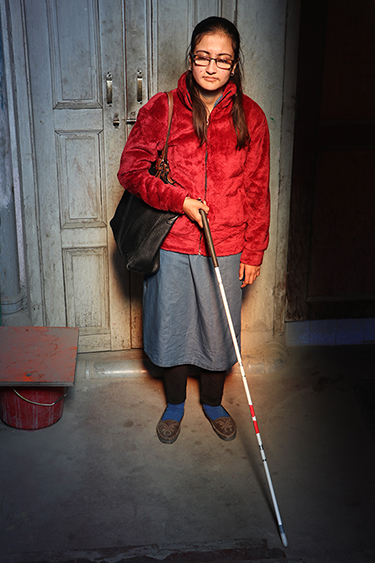 Though I am visually impaired, I am forced to face more challenges because I am a woman. Our society has basic rudimentary norms and principles which makes it very difficult for me to function on a daily basis. I am not only a woman but a woman with disability. If I reach home a little late or hang out with my friends, my neighbor would sneak peek and make assumptions about me or question my family. I and my mother have faced these questions several times. This is not just because I am visually impaired but more so because I am a woman who is also visually impaired.
Though I am visually impaired, I am forced to face more challenges because I am a woman. Our society has basic rudimentary norms and principles which makes it very difficult for me to function on a daily basis. I am not only a woman but a woman with disability. If I reach home a little late or hang out with my friends, my neighbor would sneak peek and make assumptions about me or question my family. I and my mother have faced these questions several times. This is not just because I am visually impaired but more so because I am a woman who is also visually impaired.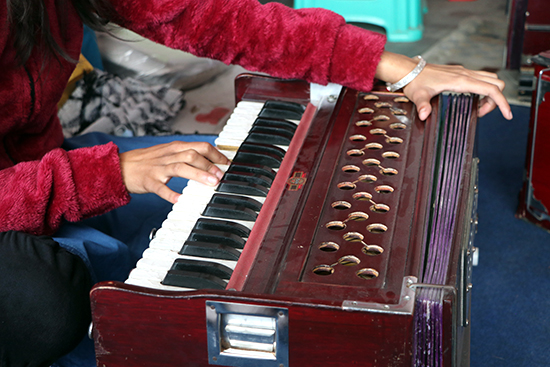 While analyzing my previous days, I think it’s my interests and the choices I made that got me where I am today. I was a good student, and because of that my mother always wanted me to work in an office. Even today, she keeps insisting me to find a job. However, I always explain to her that maybe the job will keep her happy but it will not make me happy. I’ve always loved exploring various fields and learning from them.
While analyzing my previous days, I think it’s my interests and the choices I made that got me where I am today. I was a good student, and because of that my mother always wanted me to work in an office. Even today, she keeps insisting me to find a job. However, I always explain to her that maybe the job will keep her happy but it will not make me happy. I’ve always loved exploring various fields and learning from them.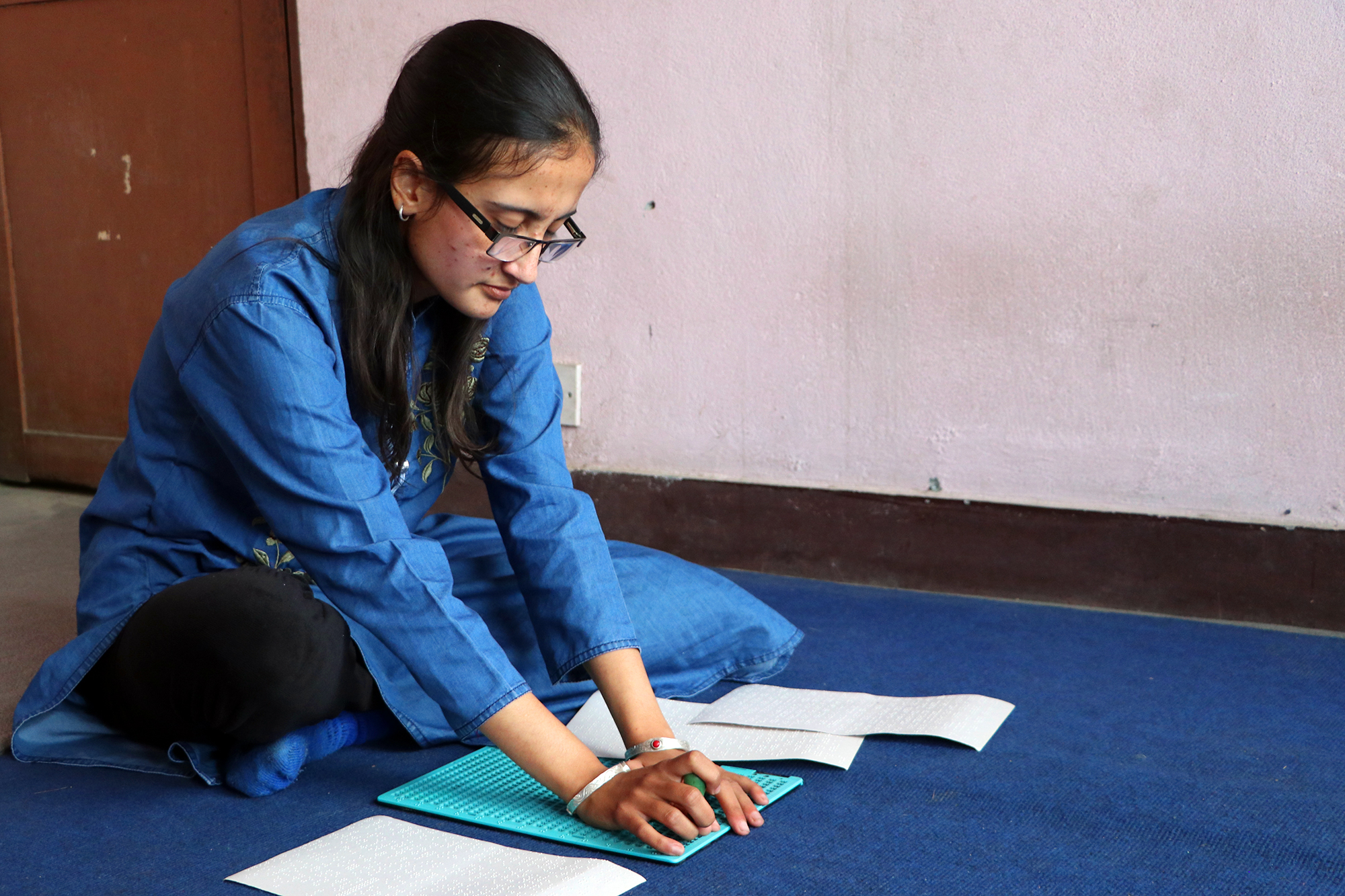

 Girls playing musical instruments were rare. In fact, it would be considered bad-omen if women, in particular, do so. Even though there were barely any girls playing musical instruments, I didn’t let that stop me. When all the young teenage boys were forming music bands, I formed a band with the girls I played basketball with. I had no idea about music. But I knew that I wanted to become play the drum, become a drummer. After my 10th grade exams, I started taking drumming lessons. Financially it was very difficult for my mother; she still managed to save some money for my drum classes. Even though I didn’t own a drum at home, I was so passionate about it that I would put pillows in front of me as though they were drums and practice.
Girls playing musical instruments were rare. In fact, it would be considered bad-omen if women, in particular, do so. Even though there were barely any girls playing musical instruments, I didn’t let that stop me. When all the young teenage boys were forming music bands, I formed a band with the girls I played basketball with. I had no idea about music. But I knew that I wanted to become play the drum, become a drummer. After my 10th grade exams, I started taking drumming lessons. Financially it was very difficult for my mother; she still managed to save some money for my drum classes. Even though I didn’t own a drum at home, I was so passionate about it that I would put pillows in front of me as though they were drums and practice. My aim was not to become a drummer. It is a will power that arose while growing up and experiencing gender discrimination. It was my rage against a society that thinks that man can only play music. It was an unintended zeal to do better than boys as I was treated differently for just being a girl. I still ponder about why did my brother had the privilege to go to a decent school and not me? There are deep-rooted inequalities in society and someone has to fight against them and I consider myself to be one. I know it’s not enough but even if it could change like 1 percentage then I’d consider myself successful. The change has to be done here, so since my childhood I never thought of leaving the country. I always wanted to do something in my own country, in my own community.
My aim was not to become a drummer. It is a will power that arose while growing up and experiencing gender discrimination. It was my rage against a society that thinks that man can only play music. It was an unintended zeal to do better than boys as I was treated differently for just being a girl. I still ponder about why did my brother had the privilege to go to a decent school and not me? There are deep-rooted inequalities in society and someone has to fight against them and I consider myself to be one. I know it’s not enough but even if it could change like 1 percentage then I’d consider myself successful. The change has to be done here, so since my childhood I never thought of leaving the country. I always wanted to do something in my own country, in my own community.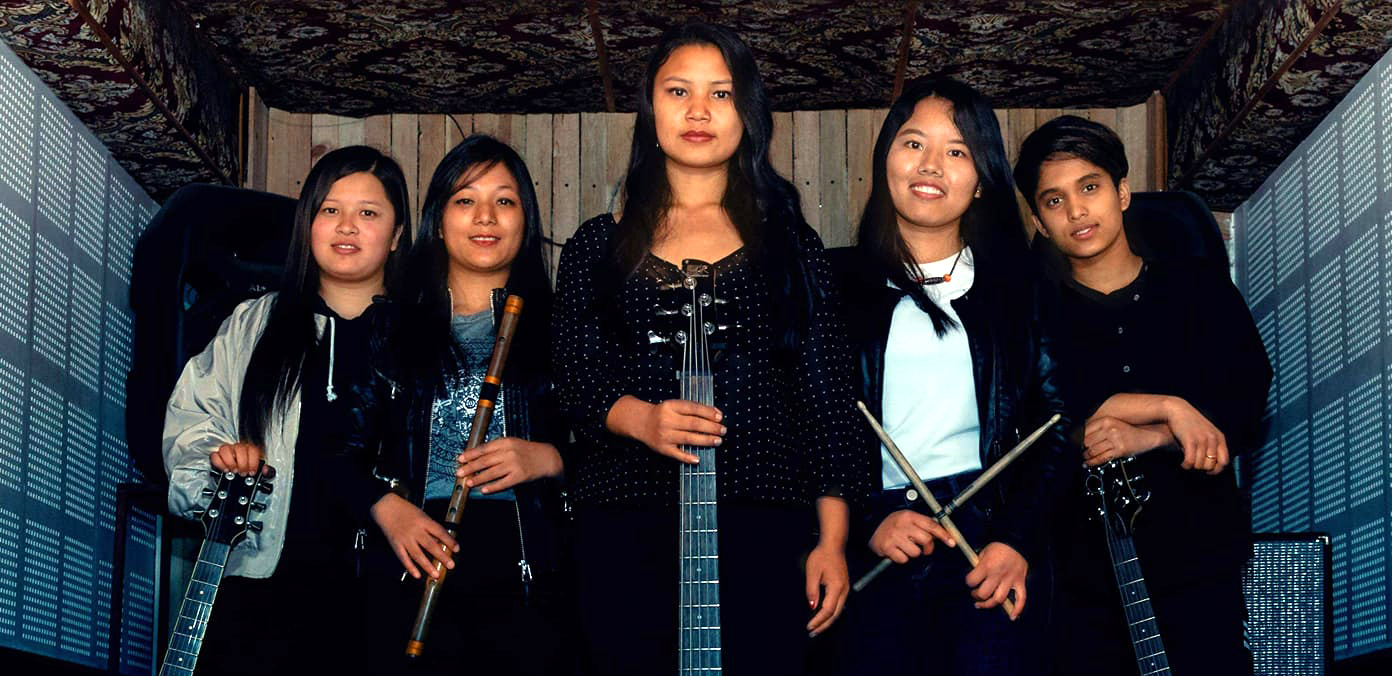

 While I was grazing the animals, and herding them to areas of good forage, my uncle’s daughters used to go to school. I really wanted to go to school; I even tried to hurt myself with the hope that they would send me. One-day, while preparing animal feed, I tried to burn myself. I still have the burn scars. No matter what I did though, my desire to go to school was never fulfilled.
While I was grazing the animals, and herding them to areas of good forage, my uncle’s daughters used to go to school. I really wanted to go to school; I even tried to hurt myself with the hope that they would send me. One-day, while preparing animal feed, I tried to burn myself. I still have the burn scars. No matter what I did though, my desire to go to school was never fulfilled. I wanted to add more cows but I had no money. I then remembered that my father had once mentioned giving me Rs. 10,000. I went to visit my parents with the hope that they would give me the money. After a lot of crying and explaining, my father finally agreed. I bought cows with that money and started saving. Anything I saved; I began investing in the cattle. From 2 cows to 4 cows, 4 to 6, so on and so forth, I started to set goals and build my own confidence.
I wanted to add more cows but I had no money. I then remembered that my father had once mentioned giving me Rs. 10,000. I went to visit my parents with the hope that they would give me the money. After a lot of crying and explaining, my father finally agreed. I bought cows with that money and started saving. Anything I saved; I began investing in the cattle. From 2 cows to 4 cows, 4 to 6, so on and so forth, I started to set goals and build my own confidence. One of those days, I had heard about some training on agriculture and cattle farming being given to women. I wasn’t able to directly participate in the training, but I got a job to deliver snacks during the training. They were teaching about agriculture and cattle farming when I got there to deliver the food. I would sit there for an hour and listen. The next meeting, I organized at my own house so I could participate and during this meeting, they taught us how women can be independent and how things can be in our favor once we were independent. I got even more confident after this training.
One of those days, I had heard about some training on agriculture and cattle farming being given to women. I wasn’t able to directly participate in the training, but I got a job to deliver snacks during the training. They were teaching about agriculture and cattle farming when I got there to deliver the food. I would sit there for an hour and listen. The next meeting, I organized at my own house so I could participate and during this meeting, they taught us how women can be independent and how things can be in our favor once we were independent. I got even more confident after this training. With my savings, I made cow sheds and 3 tunnels. Slowly, I hired helpers to help me with cattle farming and to sell the milk. Now I have 11 cows. Apart from cattle farming, vegetable farming is also doing good. I am no longer a farmer; I am a businesswoman. I pay 25,000 rupees every month to each of my helpers. To this day, many women have to explain their earnings to their husbands. But I never have to explain anything. I can spend or use my money, my way. I am an independent woman.
With my savings, I made cow sheds and 3 tunnels. Slowly, I hired helpers to help me with cattle farming and to sell the milk. Now I have 11 cows. Apart from cattle farming, vegetable farming is also doing good. I am no longer a farmer; I am a businesswoman. I pay 25,000 rupees every month to each of my helpers. To this day, many women have to explain their earnings to their husbands. But I never have to explain anything. I can spend or use my money, my way. I am an independent woman.

 After a while I found out that my aunt’s child was also autistic. They were in Kochi, India for the treatment. Me and my husband discussed about the treatment in India and decided to take our daughter. I really didn’t have to think much whether or not I should resign from my work then. I just wanted my daughter to get better. The next day after my resignation, we took our daughter to India. We stayed there for four months. The heat and the weather of India didn’t suit my daughter’s health and she often fell sick. We had to admit her to a hospital instead of the therapy center. In Kochi, they only communicate either in Malayalam or in English. Our daughter was small and didn’t speak either of the languages so communications became a major issue during her therapy sessions. During our four months stay there, she was only able to get a month’s therapy. There were not much changes in her so we decided to get her back to Nepal.
After a while I found out that my aunt’s child was also autistic. They were in Kochi, India for the treatment. Me and my husband discussed about the treatment in India and decided to take our daughter. I really didn’t have to think much whether or not I should resign from my work then. I just wanted my daughter to get better. The next day after my resignation, we took our daughter to India. We stayed there for four months. The heat and the weather of India didn’t suit my daughter’s health and she often fell sick. We had to admit her to a hospital instead of the therapy center. In Kochi, they only communicate either in Malayalam or in English. Our daughter was small and didn’t speak either of the languages so communications became a major issue during her therapy sessions. During our four months stay there, she was only able to get a month’s therapy. There were not much changes in her so we decided to get her back to Nepal. I have to pay special attention to my daughter. This is the major difference between us and mothers who have “normal” children. No matter what, we cannot be as free as other mothers. Autistic children have a different world than ours. My daughter’s therapy starts at the beginning of my day. My daughter is now six and a half years old. I need to help her to go to the toilet and brush her teeth. After a lot of therapy, she can now eat on her own. Other children can learn many things by themselves but she couldn’t. I need to teach her in a symbolic way which she can understand well. After finishing my household chores, I prepare her to do her exercise according to the schedule of her school. I spend my days mentoring her to do her exercises and playing with her.
I have to pay special attention to my daughter. This is the major difference between us and mothers who have “normal” children. No matter what, we cannot be as free as other mothers. Autistic children have a different world than ours. My daughter’s therapy starts at the beginning of my day. My daughter is now six and a half years old. I need to help her to go to the toilet and brush her teeth. After a lot of therapy, she can now eat on her own. Other children can learn many things by themselves but she couldn’t. I need to teach her in a symbolic way which she can understand well. After finishing my household chores, I prepare her to do her exercise according to the schedule of her school. I spend my days mentoring her to do her exercises and playing with her.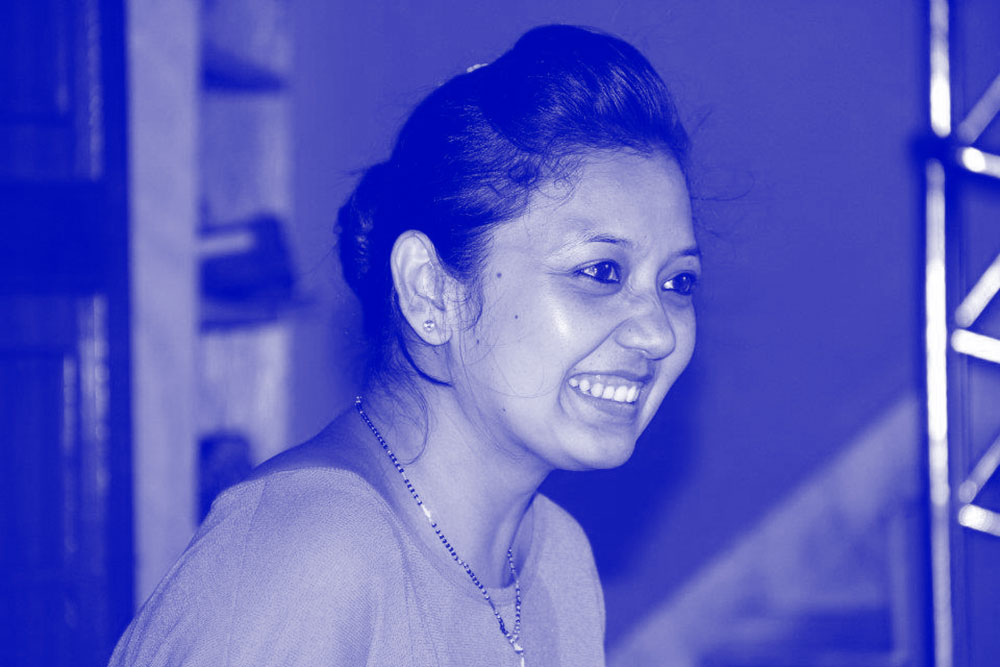

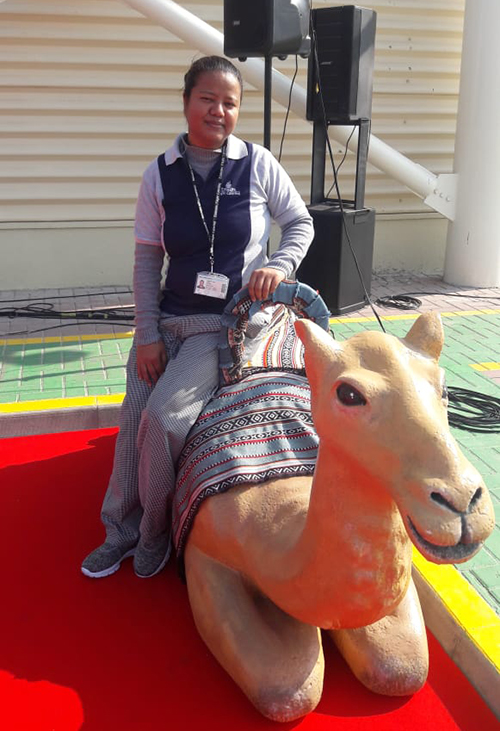 I wanted to move ahead in life instead of looking behind. I wanted to completely forget those few years after my marriage. To be honest, I never loved the man I had married then. One day I had seen him walking across the shop I was working at; I cried a lot that day. I didn’t cry because I loved him, but because of the pain that he had given me. I decided I wanted to go abroad and with the help from few people at my workplace, I started my visa process. I went Dubai on a cleaning visa. My work was alright. I used to feel very happy when I sent money back home to my parents. New place, new friends, new experience; it was all ok. My job was better since I had a bit more education than most of my colleagues so I got more facility than a normal migrant worker but I would see my colleagues suffer. They had to work long hours, couldn’t go out, eat what they wanted to, etc and that made me sad.
I wanted to move ahead in life instead of looking behind. I wanted to completely forget those few years after my marriage. To be honest, I never loved the man I had married then. One day I had seen him walking across the shop I was working at; I cried a lot that day. I didn’t cry because I loved him, but because of the pain that he had given me. I decided I wanted to go abroad and with the help from few people at my workplace, I started my visa process. I went Dubai on a cleaning visa. My work was alright. I used to feel very happy when I sent money back home to my parents. New place, new friends, new experience; it was all ok. My job was better since I had a bit more education than most of my colleagues so I got more facility than a normal migrant worker but I would see my colleagues suffer. They had to work long hours, couldn’t go out, eat what they wanted to, etc and that made me sad.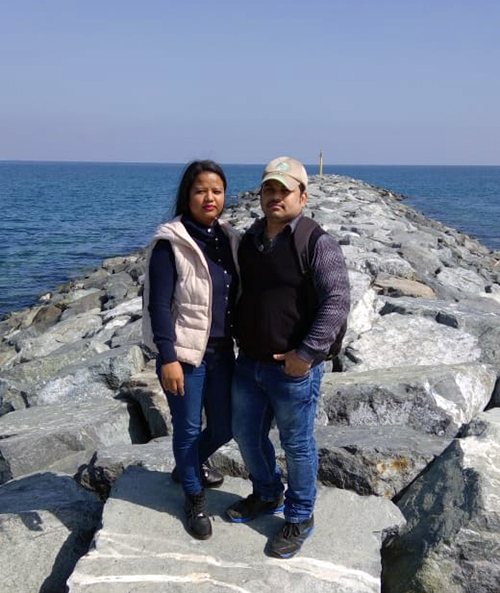 I hadn’t told my parents about my marriage yet. I thought that I should tell my mother at least. She was really angry once I told her about it but again, I thought probably she will feel better. I got pregnant and I had to come home because as migrant workers we don’t have the right to maternity in UAE. So, I called my parents and told him. I guess my father had figured out about my marriage even though I hadn’t said anything to him. He had come to pick me up at the airport. I told him that I can’t go home because mother is upset. Even after several attempts of him convincing me to go home, I didn’t give in. He finally dropped me at one of my friends’ place.
I hadn’t told my parents about my marriage yet. I thought that I should tell my mother at least. She was really angry once I told her about it but again, I thought probably she will feel better. I got pregnant and I had to come home because as migrant workers we don’t have the right to maternity in UAE. So, I called my parents and told him. I guess my father had figured out about my marriage even though I hadn’t said anything to him. He had come to pick me up at the airport. I told him that I can’t go home because mother is upset. Even after several attempts of him convincing me to go home, I didn’t give in. He finally dropped me at one of my friends’ place.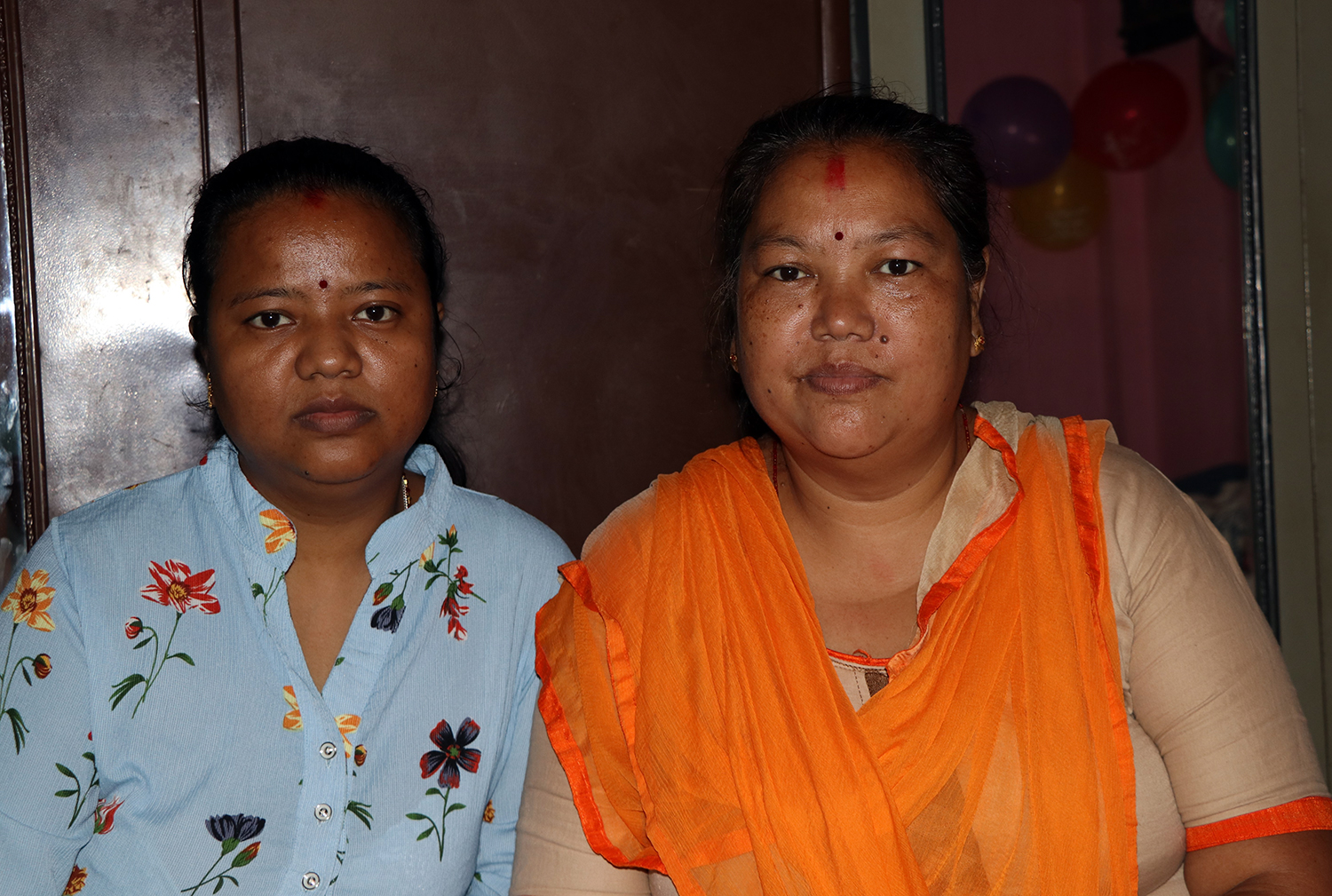

 We had to be fit and well-trained. Biologically women are different than men but the training in our camps was the same both for male and female combatants. It was all about being courageous and breaking your mental barriers. We did everything that men would do. We would fight furiously at the forefront of the battles. Many of my friends became martyrs. I am one of the lucky ones who survived death.
We had to be fit and well-trained. Biologically women are different than men but the training in our camps was the same both for male and female combatants. It was all about being courageous and breaking your mental barriers. We did everything that men would do. We would fight furiously at the forefront of the battles. Many of my friends became martyrs. I am one of the lucky ones who survived death. It was after the peace agreement that our leaders failed to protect us and the overall artists’ role became weaker. There was scarcity in the artist’s front but the leaders did not care. They would not directly tell us but their behavior showed that they didn’t need artists anymore. Many artists went back to their previous lifestyle of farming but many left for the Gulf countries in search of work.
It was after the peace agreement that our leaders failed to protect us and the overall artists’ role became weaker. There was scarcity in the artist’s front but the leaders did not care. They would not directly tell us but their behavior showed that they didn’t need artists anymore. Many artists went back to their previous lifestyle of farming but many left for the Gulf countries in search of work. After the peace process, I decided to continue my education. I completed my bachelor’s degree in journalism along with focusing on music lessons.
After the peace process, I decided to continue my education. I completed my bachelor’s degree in journalism along with focusing on music lessons.


 My birth astrological chart was taken to match with his. It matched perfectly they said. We weren’t raised to question our elders. In those days, you could not even raise your eyebrows to your parents. The wedding got fixed. But I raised my concern over my study – they said I could continue it after my marriage.
My birth astrological chart was taken to match with his. It matched perfectly they said. We weren’t raised to question our elders. In those days, you could not even raise your eyebrows to your parents. The wedding got fixed. But I raised my concern over my study – they said I could continue it after my marriage.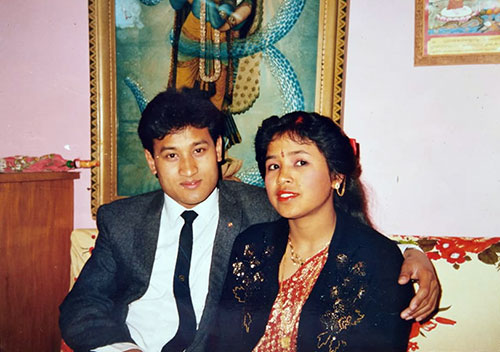 True to their word, my in-laws let me join college for my bachelor’s. I’d wake up in the morning at 4am to not miss any classes. I’d try to focus on my studies in-between my family responsibilities. Regardless of having too much chores to do, I completed my bachelor’s. I promptly enrolled myself into a Master’s program as well but I got pregnant and gave birth. A girl. Laxmi is born in the house, someone had said. After the child, it became impossible to continue my education. I had completed a semester of the Master’s program too but that went in vain. 6 years passed being a mother and then we had another baby. This time a girl child again, but not a definite Laxmi this time. Some of my in-laws were not that happy with a second girl child. I heard them saying “Oh no, not a girl again!”
True to their word, my in-laws let me join college for my bachelor’s. I’d wake up in the morning at 4am to not miss any classes. I’d try to focus on my studies in-between my family responsibilities. Regardless of having too much chores to do, I completed my bachelor’s. I promptly enrolled myself into a Master’s program as well but I got pregnant and gave birth. A girl. Laxmi is born in the house, someone had said. After the child, it became impossible to continue my education. I had completed a semester of the Master’s program too but that went in vain. 6 years passed being a mother and then we had another baby. This time a girl child again, but not a definite Laxmi this time. Some of my in-laws were not that happy with a second girl child. I heard them saying “Oh no, not a girl again!” Years passed, we upgraded from our bakery factory into the restaurant business. I had both my children going to one of the best school in the city. I wanted them to get better education than me under any circumstances. Amidst all those days of business going up and down, we made sure their education wasn’t hindered. Today, both my girls have completed their bachelors and are successfully working in their respective fields. And I’m sure they’ll pursue an even higher level of education soon, unlike their mother.
Years passed, we upgraded from our bakery factory into the restaurant business. I had both my children going to one of the best school in the city. I wanted them to get better education than me under any circumstances. Amidst all those days of business going up and down, we made sure their education wasn’t hindered. Today, both my girls have completed their bachelors and are successfully working in their respective fields. And I’m sure they’ll pursue an even higher level of education soon, unlike their mother.